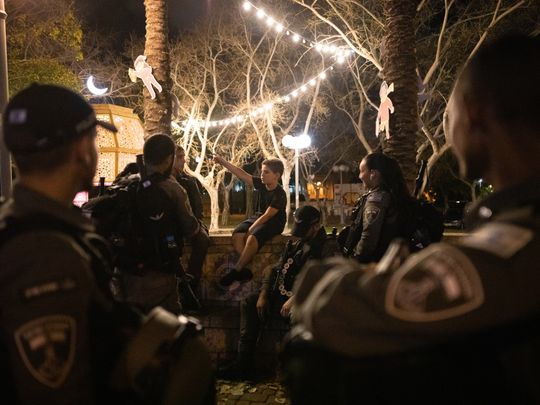
We Palestinians in Israel are never permitted to forget what we are: second-class citizens. Israel’s political establishment regularly reminds 2 million of us that our legally enforced inferior status is based solely on ethnicity. For us, it’s apartheid — nothing less.
I’m an Israeli citizen, yet every time I return home — as I do often — I’m asked by officials at the airport, “What is the reason for your visit?” That’s a question most countries’ border guards reserve for foreign visitors; Israel asks it of its minority citizens.
The fragile ceasefire between Israel and Hamas may hold through the weekend, but the underlying contradictions of Israel’s rule over millions of Palestinians remain. And the outrage from Palestinians over the past two weeks shouldn’t have come as a surprise.
Images of rampaging mobs
As my social media feeds filled with terrifying images of rampaging mobs — abetted or enabled by the police — and break-ins at Palestinian homes, my relatives in Haifa told me that they were barricading their front doors with furniture, and my sister asked me to take care of her kids if she didn’t survive the attacks.
The pressure on our communities has been building for years and exploded last week, followed by unprecedented unity among Palestinians everywhere.
Israelis were shocked to see their fellow citizens and other Palestinians protesting in Lod, Ramle, Jaffa, Haifa, Nazareth, the Galilee and elsewhere. But just as Black South Africans rebelled against their country’s systemic apartheid oppression, so, too, have Palestinian citizens of Israel stood up to demand our rights to live in equality and peace.
For years, mainstream politicians have spoken of us not as fellow citizens but in the manner that settler colonial regimes discuss Indigenous communities they seek to displace, using euphemisms such as “population transfer,” “demographic threat” and “fifth column.”
It is hard not to detect in this rhetoric the intent to rectify the “mistake” of Israel’s founders, a constant reminder the past is never dead; that past is also the present and future Israel wants to implement.
Not complete equality
In the same vein, the 2018 “nation-state law” declared that “the right to exercise national self-determination in Israel is unique to the Jewish people.” The 2 million Palestinian citizens are one-fifth of Israel’s population, but citizenship law made clear that even those of us who yearn for peace and democracy should never expect full equality.
That such a law was wildly popular speaks to decades of racism and legitimisation of fringe extremist groups. These include the Jewish Power party, a Netanyahu ally whose leader openly calls for Palestinians to be deported and stripped of their citizenship.
Years of violent, hateful rhetoric by political leaders set the stage for what we saw last week in a number of Israeli cities, where Jewish-nationalist vigilantes chanting “Death to Arabs” assaulted and lynched any Palestinian Israelis they could lay hands on, trashed Palestinian-owned businesses and terrorised residents by attempting to invade Palestinian homes. That violence left two Palestinians and a Jewish man murdered inside Israel.
Now a new generation of Palestinian leaders inside Israel refuses to live on its knees or accept the place they are allocated within Israel’s apartheid design. These activists for years have been organising and mobilising, forging unity, seeking greater representation in Israel’s parliament and building connections among Palestinian communities everywhere, supported by progressive Jewish Israelis.
It is clear to this generation that we all share the fate of the East Jerusalem Palestinians being brutally displaced by Israeli settlers and of those under occupation everywhere.
Fear of displacement
After decades of discrimination and the looming fear of displacement, Palestinian citizens were thus spurred to action by the violent raids on al-Aqsa Mosque during Ramadan, as political leaders openly encouraged and defended the nationalist lynch mobs rampaging through Palestinian neighbourhoods — and as the police left no doubt that they don’t see protecting Palestinian citizens as their duty.
Those mobs are organised in public via social media and openly declare their murderous intent and target neighbourhoods: The absence of police protection is therefore, obviously, a deliberate policy choice by the authorities.
That Palestinians everywhere sense we are at a watershed moment was made clear this week, before the Israeli military agreed to a ceasefire, by the first general strike since 1936, with millions chanting for freedom in an unprecedented show of unity across all divides, including the geographic ones created by Israel over 73 years.
The “coexistence” that we saw rupture this month was always a mirage, buried under hundreds of racist laws, enforced by a brutal security forces and by Israel’s Supreme Court — two of whose judges live in occupied Palestinian territory, in violation of international law.
If the Sheikh Jarrah forced removal is deemed legal by that court, it would simply be a reminder that Israel’s apartheid system has created its own mechanisms to legally sanctify actions that are flagrant violations of international law.
And if Israel maintains its policy of segregation of Palestinians, sadly, those demolitions are destined to become the norm.
Rula Jebreal is an author and foreign policy analyst
Washington Post








